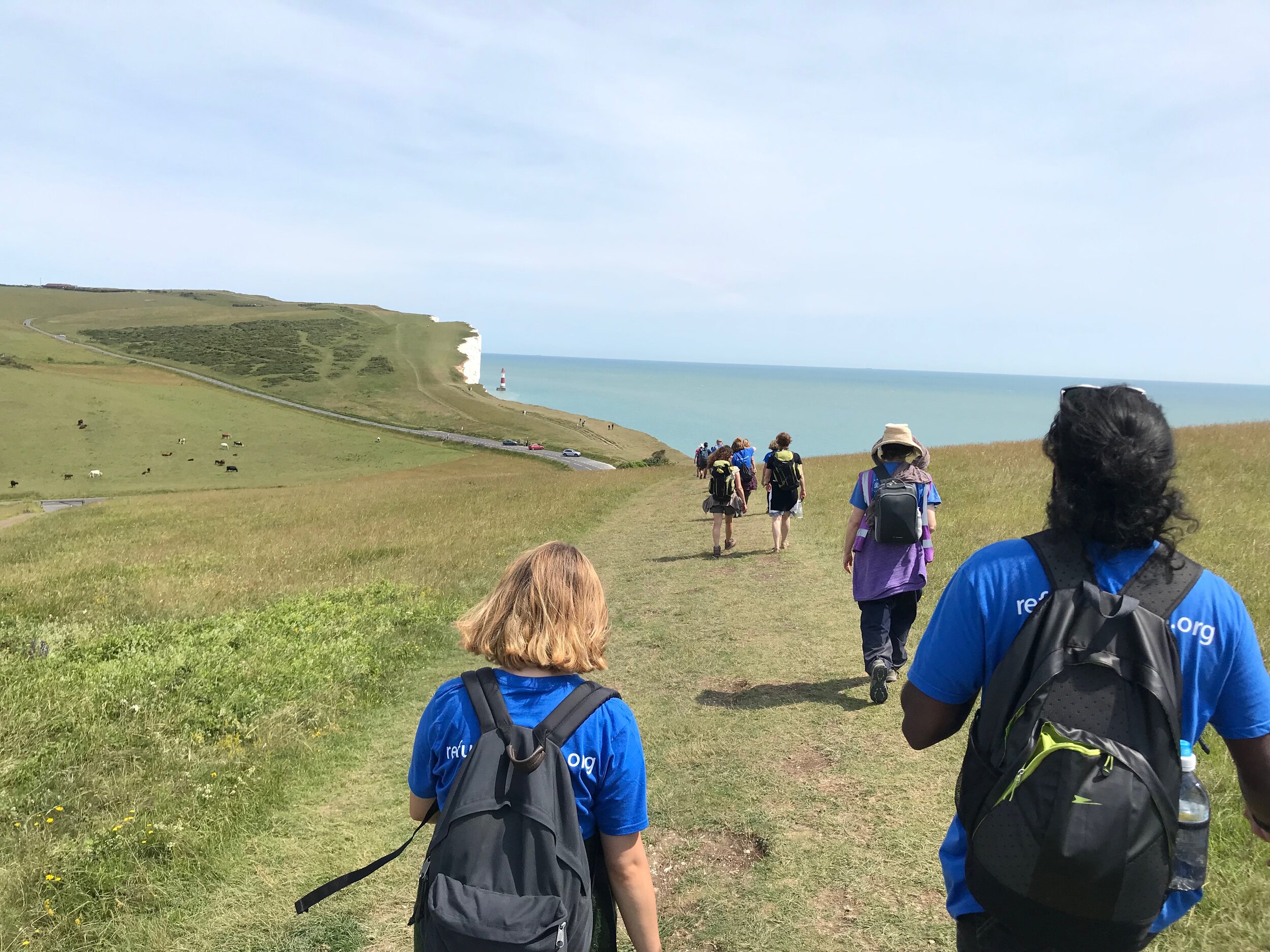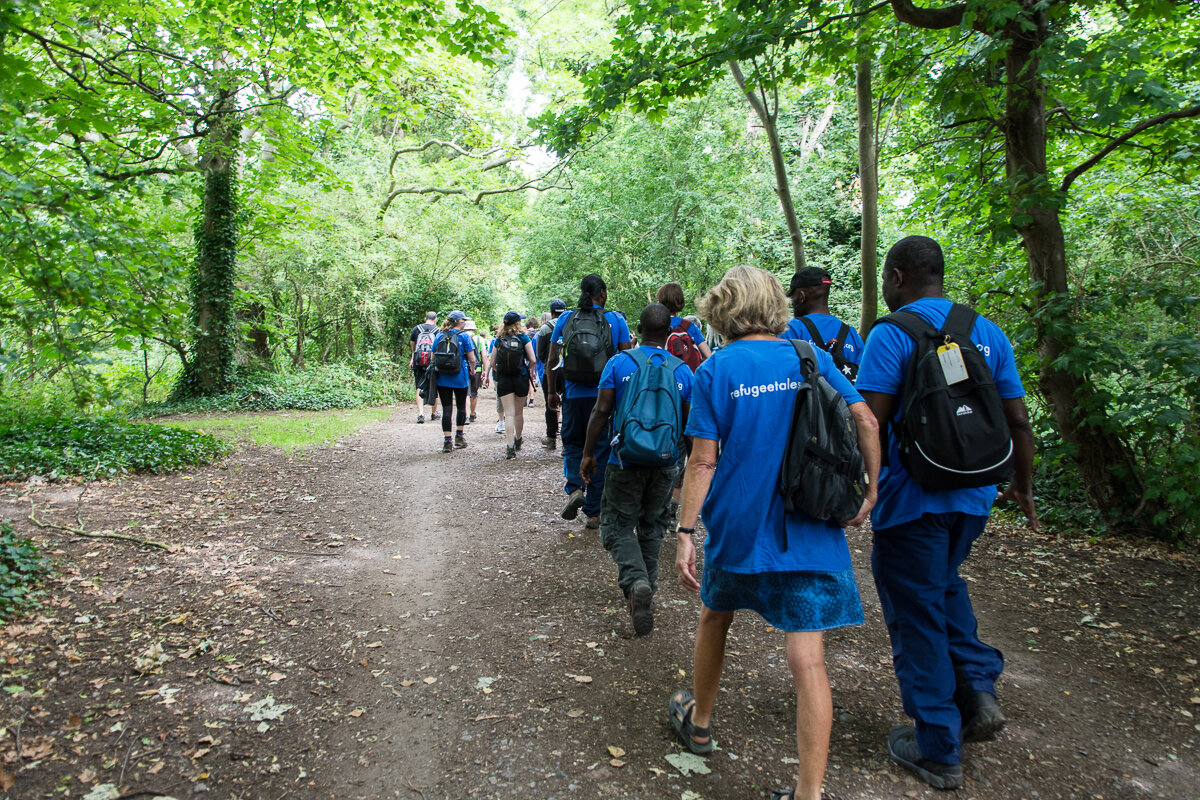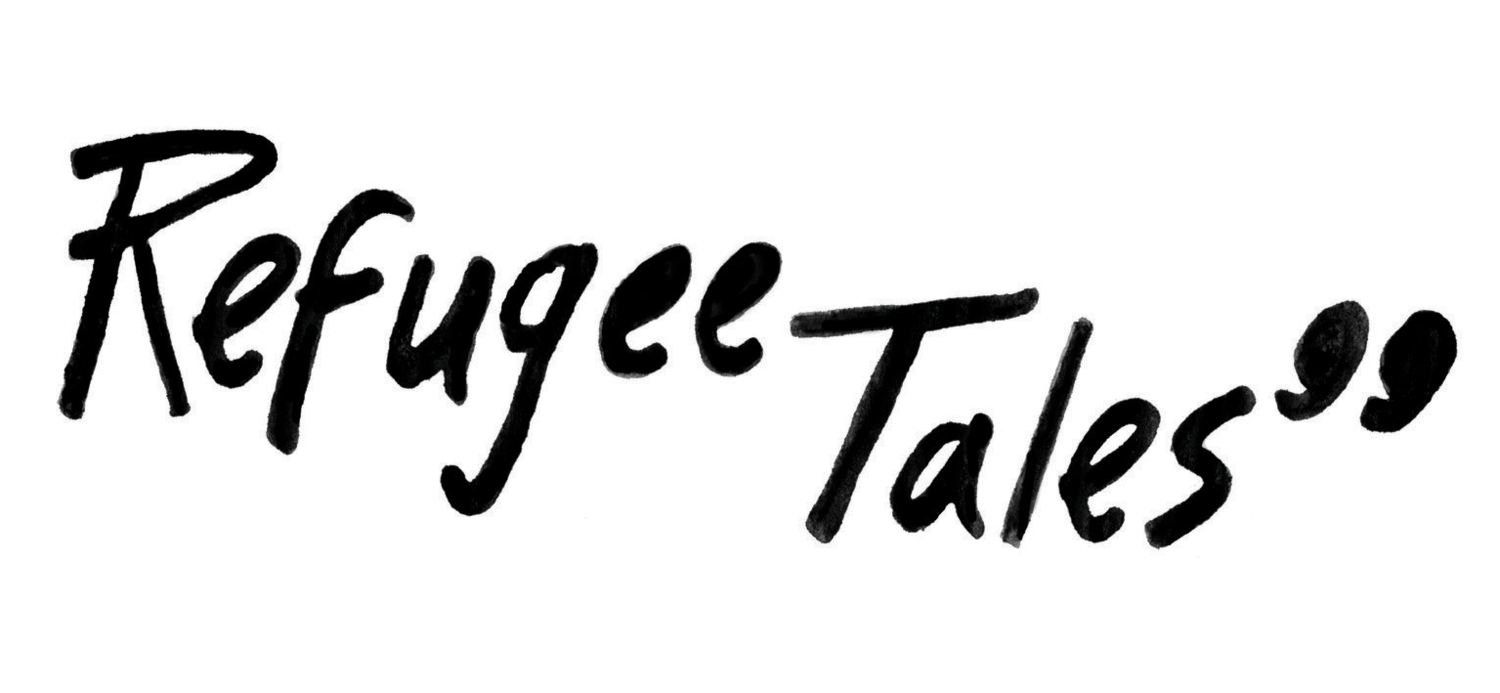
A WALKING INQUIRY
into immigration detention
Refugee Tales initiated our Walking Inquiry into Immigration Detention to complement the Public Inquiry into Brook House immigration removal centre, Gatwick, which was published by Kate Eves in September 2023. The government set up the Public Inquiry in response to a 2017 BBC Panorama programme that used undercover filming to reveal mistreatment at Brook House. The Walking Inquiry is unique, bringing together the voices and insights of people with lived experience of immigration detention, volunteer visitors who provide support to people in detention, and numerous others who joined our deliberations. We created our own methodology, building on our history of walking, talking and sharing together. We invited responses in many forms, including testimony, art, letters, video and poetry. The contributions shine a powerful light on the daily realities of immigration detention, and its complex and enduring impacts. We published our Walking Inquiry findings in July 2022.
The Walking Inquiry recommendations
We absolutely believe that the UK, like all countries, can and must work towards a future without detention: we therefore call for an end to immigration detention in the UK. As urgent first steps towards that future, and in light of the findings presented across our report, we make the following additional recommendations:
An immediate 28-day time limit on immigration detention, so that no-one is held indefinitely.
Judicial oversight within 72 hours of every decision to detain someone in immigration detention.
Improvements in the treatment and conditions of people in immigration detention, and in support for people after release from detention.
The right to work for anybody whose case for asylum takes longer than six months.
An approach to asylum grounded not in hostility but in the fundamental principles of human rights.
Scroll down to see the questions we considered, the contributions we received and the thought-provoking short films made for the Walking Inquiry.
12 June 2021 and after
On 12 June we came together again for the last of our six online gatherings. This time, we reflected on all that had been shared with the Walking Inquiry so far, and asked: What is our response?
We are delighted to share a film by the barrister and author Colin Yeo. We also invite you to look at any of the contributions and re-watch any of the previous films.
As you read, view, and reflect on the question, what is our response, you may also want to consider: Who do we respond to? What form does our response take? What is our response as individuals? And what is our collective response?
Note: Closed captioning (CC) is available in the video navigation bar.
Join the Conversation
We invite involvement from all and welcome contributions in all forms. Click titles below to see others’ contributions to the Walking Inquiry, and be inspired to add your own. By clicking ‘Take Part’ you can share your contribution.
8 May 2021 Inquiry
On 8 May we came together again (online) and explored the question: How does detention damage society?
We shared three short films to stimulate our thinking. One film is from Rabbi Jonathan Wittenberg, another by Jonathan Ellis, Project Director at Detention Forum, and in the third film, Refugee Tales walker and poet Steve Collis interviews writer and activist Harsha Walia.
Note: Closed captioning (CC) is available in the video navigation bar.
Join the Conversation
We invite involvement from all and welcome contributions in all forms. Click titles below to see others’ contributions to the Walking Inquiry, and be inspired to add your own. By clicking ‘Take Part’ you can share your contribution.
10 April 2021 Inquiry
On 10 April we came together (online) and explored the question: Why are people who have experienced detention not heard?
We shared two new films to stimulate our thinking. One shares the voices of people who have experienced detention, volunteer visitors and supporters of Refugee Tales. The other features David Herd, Professor of Modern Literature at the University of Kent and an organiser of Refugee Tales.
As you watch and reflect on the main question, you may want to consider: Why is it important that we hear the voices of people who have experiecned detention? And when we think about people who have experienced detention not being heard, to consider: Ignored by whom? Silenced by whom? Heard by whom?
Note: Closed captioning (CC) is available in the video navigation bar.
Content warning – This video contains discussions about the impact of detention on mental health that some may find emotionally upsetting.
Join the Conversation
We invite involvement from all and welcome contributions in all forms. Click titles below to see others’ contributions to the Walking Inquiry, and be inspired to add your own. By clicking ‘Take Part’ you can share your contribution.
13 March 2021 Inquiry
On 13 March we came together (online) to explore the question: What are the long-term impacts of detention?
We have two films to help us consider this question. One shares the voices of people who have experienced detention and a volunteer visitor. The other features Theresa MacIntyre, a psychotherapist who has worker with many people in detention, and Shaun Owen and Indre Lechtimiakyte from Samphire, a charity that supports people after detention.
As you watch, we invite you to consider some further questions: How does detention affect people’s physical and mental health? What are the hidden impacts? What forms of support can we offer to help overcome the trauma? What could be different?
Note: Closed captioning (CC) is available in the video navigation bar.
Content warning - This video features discussions about the impact of detention on mental health, including references to mental illness, depression and self-harm.
Join the Conversation
We invite involvement from all and welcome contributions in all forms. Click titles below to see others’ contributions to the Walking Inquiry, and be inspired to add your own. By clicking ‘Take Part’ you can share your contribution.
20 February 2021 Inquiry
On 20 February we came together (online) to explore the questions: how are people detained? What are the systems and structures of detention?
We share two short films to help us consider these questions. One is made by people who have experienced detention and by volunteer visitors. The other is from academic Dr. Lucy Williams. As you watch, we invite you to consider some further questions: what does this say about our society? What do I find acceptable or unacceptable about such a system? What could be different?
Note: Closed captioning (CC) is available in the video navigation bar.
Content warning - This video contains references to self-harm and suicide.
Join the Conversation
We invite involvement from all and welcome contributions in all forms. Click titles below to see others’ contributions to the Walking Inquiry, and be inspired to add your own. By clicking ‘Take Part’ you can share your contribution.
30 January 2021 Inquiry
On 30 January we came together (online) to explore our first Walking Inquiry question: what is it like to be detained?
This short film shares the voices of people who have experienced detention.
Note: Closed captioning (CC) is available in the video navigation bar.
Join the Conversation
We invite involvement from all and welcome contributions in all forms. Click titles below to see others’ contributions to the Walking Inquiry, and be inspired to add your own. By clicking ‘Take Part’ you can share your contribution.








